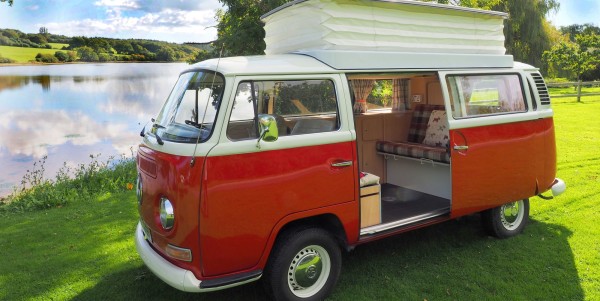
As it’s getting towards the end of summer, it’s too easy to start thinking of autumn approaching and planning your trips ahead. If you’ve fallen in love with campervanning, it’s tempting to want to do it all year round, especially if it’s a relatively new hobby that you’ve recently become interested in. As anyone who lives in a country with various seasons knows, the transition from warmer to cooler temperatures can be a drastic change! Suppose you’re already thinking of going camping this autumn or winter. In that case, this can be an even trickier challenge – the colder temperatures can make campervanning very difficult and present challenges when travelling. Here are some things to consider to ensure you survive your first autumn or winter camping trip…
Fail to Prepare, Prepare to Fail
As the well-known saying indicates, the key to the success of your trip will be planning ahead of time to ensure you’ve thought of everything. Make sure you start thinking about your trip a month in advance so you can order or purchase anything you may need! Packing for the worst-case scenario may sound completely drastic, but knowing how unpredictable Mother Nature can be, it’s not worth taking the risk of needing emergency supplies. Think of things like taking extra clothes, food and water. Luckily, campervanning means you never have to carry around any of your belongings, so take advantage of this and ensure you’re not caught! Whilst it isn’t sensible to overpack, ensuring you have all you need when travelling in unpredictable conditions is essential.
Not planning your route may seem exciting, but in winter, with its early sunsets and frost, it’s much more sensible to plan your route and know exactly where you’re going. Once you’ve decided on your chosen locations, plan an itinerary for all weather situations. Make sure you have something to do every day, and you’re never too far from civilisation should anything occur. If you research your areas thoroughly, you should never have a problem on your trip. Taking a paper map and torches is always a good idea, too – never rely solely on GPS, even in this day and age!
Don’t forget to bring with you a first aid kit to survive campervanning. You’ll never know if an emergency strikes. So, include first aid supplies for treating wounds, insect bites, fractures, and frostbite. Moreover, bring over-the-counter drugs, like antipyretics, and your prescribed medicines for hypertension, diabetes, or other medical conditions.
A crucial aspect of the preparation process includes getting yourself covered with insurance. Snowmobile insurance can protect you against potential liabilities and damages. This insurance covers physical injury sustained when a snowmobile-related accident happens. The collision coverage also includes property damage liability. Furthermore, it helps snowmobile owners mitigate property damage to third parties.
If you decide to campervan in a public or private campground, know the rules or laws in the area. Some places have restrictions at certain times, especially in winter. In addition, it’s crucial to equip yourself with the right information about campervanning etiquettes, such as keeping the area clean and not moving firewood to avoid causing a wildfire.
Make sure to let other people know that you’re going on a campervan journey. If you can’t get home at your stated time or day or an accident happens, someone knows where you’re located. Saving the numbers of authorities and emergency contacts is also recommended.
Keep Warm
This may sound obvious, but it’s very easy to overlook if you’re planning your trip at the end of summer in your t-shirt and shorts! You can never think about things too much when packing to go on a trip in autumn/winter, and being warm will be the key to being comfortable.
Clothes will be the most important thing to think about during daytime – layers will be the key to being warm and dry, so make sure you take plenty to cover all days and spares in case you get caught in some adverse weather. Layers are much more effective than one massive coat for trapping the heat and keeping you warm. Be wary of cotton materials as these absorb moisture and will mean you get cold quicker! Stick to fleeces, wool and synthetic materials to keep you toasty and warm on your winter walks. Don’t forget your extremities either – these will get cold the quickest in the freezing temperatures. Bring hats, gloves, and extra thick socks you can layer up to keep your feet and hands warm. Spare socks will be essential if you ruin yours or if someone else in your party needs to borrow some! If you’re planning on walking a lot, gaiters are also helpful and will act as a barrier between the elements and your feet – perfect for snow or rain.
Night time will be the coldest time of day so make sure you don’t overlook this just because you are in a campervan! There are so many tricks and tips you can do to your campervan to keep it toasty for the autumn/winter time. Make sure you pack a high tog of duvet cover and plenty of blankets to keep the chill out at night. Concerning the build of your campervan, consider your electrics and how these could improve your standard of living. Good quality electrics such as CBE can significantly impact your camping experience. Whilst not everyone can afford all the electricity that it’s possible to have nowadays for campervans, investing in some electric windows can be a great way to trap the heat and make life much easier for you and your camping companions. High-quality sockets with a modular system mean you can have a more practical layout for all your electrics in your campervan, and everyone knows how important having a kettle, toaster, and hairdryer will be on those cold nights and mornings!
Setting Up
Before you even get there, check online to ensure you end up at a reputable campsite with plenty of amenities. These will be even more essential in wintertime, as you will need water and electricity hook-ups and a gas supply that won’t fail you and leave you stranded. Check on camping forums and read reviews from fellow campers to ensure you get the best possible campsite for your money. Making sure you get the right spot on the campsite can also be very important! Make sure you get there early to avoid disappointment and also to avoid setting up in the dark, which will be very impractical. Whilst you may try and avoid this, it may happen at one time or another, so bring plenty of torches and keep your van organised so you can go to sleep that night without too many issues that can’t be sorted in the morning. Parking next to a tree can be a lifesaver with the wet ground as this will be the driest ground and prevent your campervan from sinking. Take four driving mats to park your wheels on to stop this from happening – this will be invaluable if you end up in a downpour! Consider where you will get wind protection, and take a windbreaker to help you when cooking.
Whether this has put you off or inspired you to travel this winter in your campervan, you can be sure every eventuality and possibility will have crossed your mind to prepare you for your trip!




 POSTED BY
POSTED BY 

